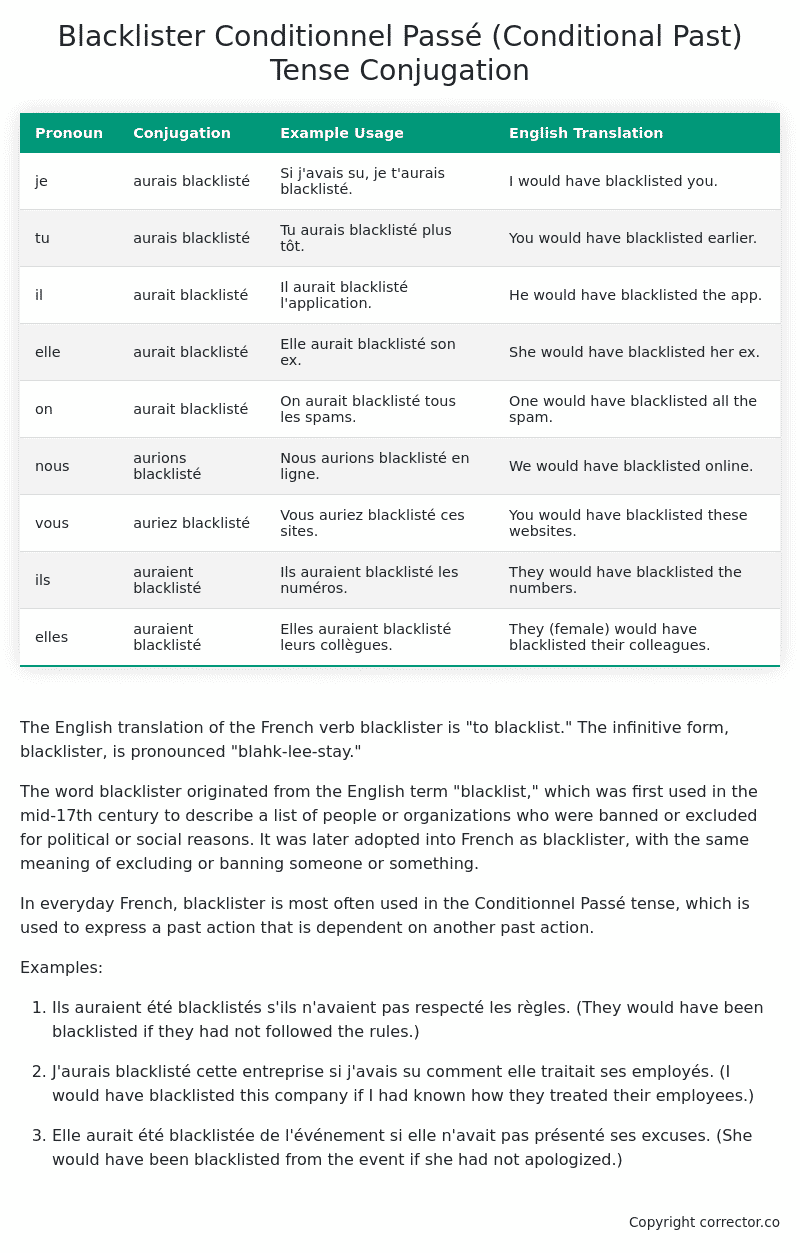Conditionnel Passé (Conditional Past) Tense Conjugation of the French Verb blacklister
Introduction to the verb blacklister
The English translation of the French verb blacklister is “to blacklist.” The infinitive form, blacklister, is pronounced “blahk-lee-stay.”
The word blacklister originated from the English term “blacklist,” which was first used in the mid-17th century to describe a list of people or organizations who were banned or excluded for political or social reasons. It was later adopted into French as blacklister, with the same meaning of excluding or banning someone or something.
In everyday French, blacklister is most often used in the Conditionnel Passé tense, which is used to express a past action that is dependent on another past action.
Examples:
-
Ils auraient été blacklistés s’ils n’avaient pas respecté les règles. (They would have been blacklisted if they had not followed the rules.)
-
J’aurais blacklisté cette entreprise si j’avais su comment elle traitait ses employés. (I would have blacklisted this company if I had known how they treated their employees.)
-
Elle aurait été blacklistée de l’événement si elle n’avait pas présenté ses excuses. (She would have been blacklisted from the event if she had not apologized.)
Table of the Conditionnel Passé (Conditional Past) Tense Conjugation of blacklister
| Pronoun | Conjugation | Example Usage | English Translation |
|---|---|---|---|
| je | aurais blacklisté | Si j’avais su, je t’aurais blacklisté. | I would have blacklisted you. |
| tu | aurais blacklisté | Tu aurais blacklisté plus tôt. | You would have blacklisted earlier. |
| il | aurait blacklisté | Il aurait blacklisté l’application. | He would have blacklisted the app. |
| elle | aurait blacklisté | Elle aurait blacklisté son ex. | She would have blacklisted her ex. |
| on | aurait blacklisté | On aurait blacklisté tous les spams. | One would have blacklisted all the spam. |
| nous | aurions blacklisté | Nous aurions blacklisté en ligne. | We would have blacklisted online. |
| vous | auriez blacklisté | Vous auriez blacklisté ces sites. | You would have blacklisted these websites. |
| ils | auraient blacklisté | Ils auraient blacklisté les numéros. | They would have blacklisted the numbers. |
| elles | auraient blacklisté | Elles auraient blacklisté leurs collègues. | They (female) would have blacklisted their colleagues. |
Other Conjugations for Blacklister.
Le Present (Present Tense) Conjugation of the French Verb blacklister
Imparfait (Imperfect) Tense Conjugation of the French Verb blacklister
Passé Simple (Simple Past) Tense Conjugation of the French Verb blacklister
Passé Composé (Present Perfect) Tense Conjugation of the French Verb blacklister
Futur Simple (Simple Future) Tense Conjugation of the French Verb blacklister
Futur Proche (Near Future) Tense Conjugation of the French Verb blacklister
Plus-que-parfait (Pluperfect) Tense Conjugation of the French Verb blacklister
Passé Antérieur (Past Anterior) Tense Conjugation of the French Verb blacklister
Futur Antérieur (Future Anterior) Tense Conjugation of the French Verb blacklister
Subjonctif Présent (Subjunctive Present) Tense Conjugation of the French Verb blacklister
Subjonctif Passé (Subjunctive Past) Tense Conjugation of the French Verb blacklister
Subjonctif Imparfait (Subjunctive Imperfect) Tense Conjugation of the French Verb blacklister
Conditionnel Présent (Conditional Present) Tense Conjugation of the French Verb blacklister
Conditionnel Passé (Conditional Past) Tense Conjugation of the French Verb blacklister (this article)
L’impératif Présent (Imperative Present) Tense Conjugation of the French Verb blacklister
L’infinitif Présent (Infinitive Present) Tense Conjugation of the French Verb blacklister
Struggling with French verbs or the language in general? Why not use our free French Grammar Checker – no registration required!
Get a FREE Download Study Sheet of this Conjugation 🔥
Simply right click the image below, click “save image” and get your free reference for the blacklister Conditionnel Passé tense conjugation!

Blacklister – About the French Conditionnel Passé (Conditional Past) Tense
Formation
Common Everyday Usage Patterns
Expressing Unreal Past Scenarios
Polite Requests or Suggestions
Expressing Doubt or Uncertainty
Interactions with Other Tenses
Conditional Present
Indicative Past Tenses
Conditional Future
Summary
Want More?
I hope you enjoyed this article on the verb blacklister. Still in a learning mood? Check out another TOTALLY random French verb conjugation!


